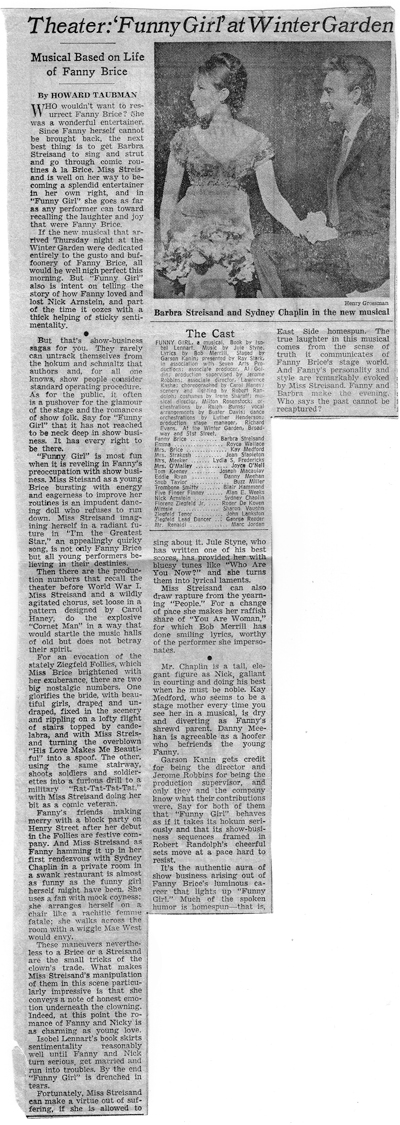Musical Based on Life of Fanny Brice

By Howard Taubman
NY Times
March 27, 1964
Who wouldn't want to resurrect Fanny Brice? She was a wonderful entertainer.
Since Fanny herself cannot be brought back, the next best thing is to get Barbra Streisand to sing and strut and go through comic routines à la Brice. Miss Streisand is well on her way to becoming a splendid entertainer in her own right, and in "Funny Girl" she goes as far as any performer can toward recalling the laughter and joy that were Fanny Brice.
If the new musical that arrived last night at the Winter Garden were dedicated entirely to the gusto and buffoonery of Fanny Brice, all would be well nigh perfect this morning. But "Funny Girl" also is intent on telling the story of how Fanny loved and lost Nick Arnstein and part of the time it oozes with a thick helping of stick sentimentality.
But that's show-business sagas for you. They rarely can untrack themselves from the hokum and schmaltz that authors and, for all one knows, show people consider standard operating procedure. As for the public, it often is a pushover for the glamour of the stage and the romances of show folk. Say for "Funny Girl" that it has not reached to be neck deep in show-business. It has every right to be there.
"Funny Girl" is most fun when it is reveling in Fanny's preoccupation with show business. Miss Streisand as a young Brice bursting with energy and eagerness to improve her routines is an impudent dancing doll who refuses to run down. Miss Streisand imagining herself in a radiant future in "I'm the Greatest Star," an appealingly quirky song, is not only Fanny Brice but all young performers believing in their destinies.
Then there are the production numbers that recall the theater before World War I. Miss Streisand and a wildly agitated chorus, set loose in a pattern designed by Carol Haney, do the explosive "Cornet Man" in a way that would startle the music halls of old but does not betray their spirit.
For an evocation of the stately Ziegfeld Follies, which Miss Brice brightened with her exuberance, there are two big nostalgic numbers. One glorifies the bride, with beautiful girls, draped and undraped, fixed in the scenery and rippling on a lofty flight of stairs topped by candelabra, and with Miss Streisand, and with Miss Streisand turning the overblown "His Love Makes Me Beautiful" into a spoof. The other, using the same stairway, shoots soldiers and soldierettes into a furious drill to a military "Rat-Tat-Tat-Tat," with Miss Streisand doing her bit as a comic veteran.
Fanny's friends making merry with a block party on Henry Street after her debut in the Follies are festive company. And Miss Streisand as Fanny hamming it up in her first rendezvous with Sydney Chaplin in a private room in a swank restaurant is almost as funny as the funny girl herself might have been. She uses a fan with mock coyness; she arranges herself on a chair like a rachitic femme fatale; she walks across the room with a wiggle Mae West would envy.
These maneuvers nevertheless to a Brice or a Streisand are the small tricks of the clown's trade. What makes Miss Streisand's manipulation of them in this scene particularly impressive is that she conveys a note of honest emotion underneath the clowning. Indeed, at this point the romance of Fanny and Nicky is as charming as young love.
Isobel Lennart's book skirts sentimentality reasonably well until Fanny and Nick turn serious, get married and run into troubles. By the end "Funny Girl" is drenched in tears.
Fortunately, Miss Streisand can make a virtue out of suffering, if she is allowed to sing about it. Jule Styne, who has written one of his best scores, has provided her with bluesy tunes like "Who Are You Now?" and she turns them into lyrical laments.
Miss Streisand can also draw rapture from the yearning "People." For a change of pace she makes her raffish share of "You Are Woman," for which Bob Merrill has done smiling lyrics, worthy of the performer she impersonates.
Mr. Chaplin is a tall, elegant figure as Nick, gallant in courting and doing his best when he must be noble. Kay Medford, who seems to be a stage mother every time you see her in a musical, is dry and diverting as Fanny's shrewd parent. Danny Meehan is agreeable as a hoofer who befriends the young Fanny.
Garson Kanin gets credit for being the director and Jerome Robbins for being the production supervisor, and only they and the company know what their contributions were. Say for both of them that "Funny Girl" behaves as if it takes its hokum seriously and that its show-business sequences framed in Robert Randolph's cheerful sets move at a pace hard to resist. It's the authentic aura of show business arising out of Fanny Brice's luminous career that lights up "Funny Girl." Much of the spoken humor is homespun--that is, East Side homespun. The true laughter in this musical comes from the sense of truth it communicates of Fanny Brice's stage world. And Fanny's personality and style are remarkably evoked by Miss Streisand. Fanny and Barbra make the evening. Who says the past cannot be recaptured?
End.
Related Links: Funny Girl, Broadway Show pages
